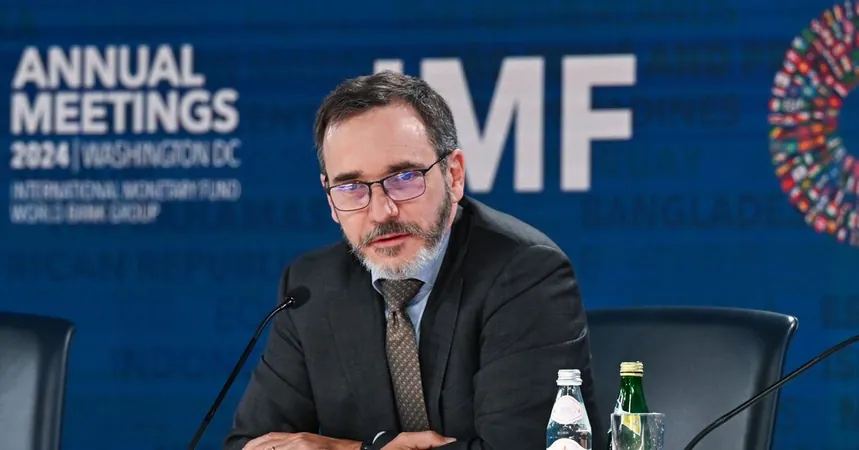
U.S. Economy Robust as Global Growth Stagnates: IMF Raises Forecast
2025-01-17
Author: Lok
U.S. Growth Forecast Upgraded
The International Monetary Fund (IMF) has announced a more optimistic outlook for the U.S. economy, predicting a growth rate of 2.7% for 2025, a revision up from their prior estimate of 2.2%. This increase is attributed to a resilient labor market and a noticeable uptick in investments, putting the U.S. economy on a trajectory divergent from many other regions worldwide.
Divergence in Global Growth
Pierre-Olivier Gourinchas, the IMF's chief economist, emphasized in a recent press briefing, “The big story is the divergence between the U.S. and the rest of the world.” He noted that the potential for output growth in the U.S. is stronger compared to pre-pandemic levels, while regions like the euro area and China demonstrate weakened growth prospects largely due to manufacturing sector struggles and ongoing political uncertainties.
Concerns of Economic Policy Uncertainty
Despite initial fears of a post-pandemic global recession, the IMF's latest World Economic Outlook report shows that global output is expected to rise by 3.3% in both the current and following year, a slight improvement from earlier forecasts. However, the report also raises concerns about heightened economic policy uncertainty stemming from newly formed governments globally, which could impact growth trajectories.
U.S. Economic Wild Cards
In the United States, the incoming administration of Donald Trump presents numerous economic wild cards with proposed tax cuts, deregulation, tariffs, and immigration restrictions, all of which could potentially lead to inflationary pressures, according to Gourinchas.
Cautions on Expansionary Policies
While the IMF notes that such expansionary fiscal policies could bolster short-term growth, they caution that overly aggressive deregulation may lead to “boom-bust dynamics” in the economy, creating instability in the long run. The IMF has warned that while growth in the U.S. may outpace other advanced economies, risks loom in the euro area and China, where manufacturing performance remains lackluster, and consumer confidence is low.
Global Financial Sensitivities
"The financial landscape is particularly sensitive to any shifts in U.S. policy,” stated Kristalina Georgieva, IMF Managing Director, underscoring the global interest in how the new administration’s tariffs and tax policies might unfold.
Inflation and Interest Rates
Inflation rates in the U.S. have moderated, but recent months have shown stagnation in efforts to control price increases. The Federal Reserve has indicated that interest rate cuts may be limited, leaving analysts speculating that rates might not drop further in the immediate future.
Global Economic Resilience
Despite the hurdles, the global economy has shown remarkable resilience amid years of upheaval, including the pandemic and geopolitical conflicts. The IMF forecasts that global inflation is set to decrease to 4.2% by 2025, a sign that the economic disruptions of recent years are finally starting to resolve.
Conclusion
In conclusion, as the U.S. continues to lead in economic growth against a backdrop of international stagnation, the unfolding policies under the new administration are expected to play a critical role in shaping not just the national economy but the global landscape as well. Will these decisions cement the U.S. economic dominance or lead to unforeseen repercussions? Only time will tell.



 Brasil (PT)
Brasil (PT)
 Canada (EN)
Canada (EN)
 Chile (ES)
Chile (ES)
 Česko (CS)
Česko (CS)
 대한민국 (KO)
대한민국 (KO)
 España (ES)
España (ES)
 France (FR)
France (FR)
 Hong Kong (EN)
Hong Kong (EN)
 Italia (IT)
Italia (IT)
 日本 (JA)
日本 (JA)
 Magyarország (HU)
Magyarország (HU)
 Norge (NO)
Norge (NO)
 Polska (PL)
Polska (PL)
 Schweiz (DE)
Schweiz (DE)
 Singapore (EN)
Singapore (EN)
 Sverige (SV)
Sverige (SV)
 Suomi (FI)
Suomi (FI)
 Türkiye (TR)
Türkiye (TR)
 الإمارات العربية المتحدة (AR)
الإمارات العربية المتحدة (AR)